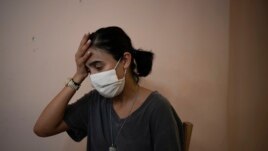14 August 2020
For nearly a week, Mona Zahran slept on a couch pulled across the front door of her home in Beirut. The powerful explosion in Lebanon's capital on August 4 had broken her door and windows. She feared robbers might try to enter her house at night.
It was the latest hardship in the difficult life of the 50-year-old.
A few months ago, Zahran lost her job because of anti-government protests, Lebanon's economic collapse and coronavirus restrictions.
Now, she could be robbed of her house in the insecure conditions created by the explosion.
"It is no shame to be poor. But this home is the only thing I have left," she said.
Throughout past political crises, the Lebanese always somehow kept their way of life unshaken. That appears impossible now.
Lina Mounzer, a Lebanese writer, says her country has been slowly sinking into a "terrible state." There is a severe lack of public and social services while a few people profited by exploiting the warring and other unrest in the country.
Now almost half of the population is in poverty, up from about 20% two years ago. The banking system — once a highly valued part of Lebanon's economy — is in severe decline. Unemployment is increasing.
"Everything we were able to imagine belongs to one world and now we are in the world of the unimaginable," Mounzer said. "It is incomparable to anything that any of us has lived before. And we have been through wars."
Zahran's family home is in Karantina, one of Beirut's poorest neighborhoods, overlooking the port.
She says the explosion sent glass flying, hitting her as she lay on her couch. She remembers shouting for her dead mother.
Her thoughts turned to her years as a child, when Karantina was often under attack during the 15-year-long civil war. It ended in 1990. Her first thought was that she would have to leave her home again, as her family did in 1976. Her parents and their five children lived in a single hotel room for years.
After the explosion, she ran through the house, checking on her family members. Her 60-year-old brother and two other relatives were buried in glass and bloody from cuts. The explosion blew out windows and doors and damaged two rooms.
"It was the definition of terror," said Zahran. "The only thing that provides us security is this house."
Volunteer workers recently put in a temporary, wooden door on Zahran's home for free.
For Zahran, Lebanon's politics are too complex. But she is sure of one thing: "Our rulers are not worthy of this country."

Rachelle Boumelhem reacts during an interview in her damaged beauty salon in Beirut, Lebanon, Monday, Aug. 10, 2020.
Less than two kilometers away, in the wealthy Achrafieh area, Rachelle Boumelhem sits among the ruins of her beauty shop.
Volunteers have cleared away the glass. But the shop, her dream investment in Lebanon, lost walls to the explosion. Small pieces of glass remain stuck in Boumelhem's legs. Her younger sister is recovering from injuries caused by flying wreckage.
After pushing through many of Lebanon's crises, the 29-year-old Boumelhem now feels her will might be destroyed, like her shop.
"That is the first time I feel everything collapsed on our head, morally and physically," she said. "How is it that on Aug. 4 at 6:08 p.m., all of this stopped?"
Boumelhem had chosen to build her life in Lebanon.
She was born in Australia. Her parents returned with her to Lebanon a few years after the civil war ended. A marketing specialist, she returned to Sydney in 2016, considering a life there, but after a few months returned home to open the shop with her mother and sisters.
They invested almost $300,000 in the business. They chose to open it in Achrafieh partly for security reasons, believing it would be less affected if unrest returned to the country.
It did. Protests that began in October forced the family to close the shop for the first time. Protesters took over central Beirut, blocking roads. The demonstrators succeeded in forcing the government to resign.
"We got through it and we moved on. Then COVID happened and we were forced into lockdown. I thought again it is the end," she said.
But she kept the business alive. During closure, she offered its beauty services at individual's homes. The financial crisis offered a freak opportunity. She kept prices low. The business grew by 15 percent.
Boumelhem spent the summer urging friends to be hopeful, that the future of business looked good. There was no reason to fear additional conflict, she argued, although tensions between Lebanon's Hezbollah group and Israel were rising.
After the explosion, customers and friends began an online campaign to raise money for the shop. Boumelhem also hopes the government will inspect her shop and give her money for damages.
Lebanon "never had a break," said Boumelhem, adding that her hard work would have made her a major success in other places. But she does not know if she can start over.
"I am not sure where I stand now, honestly," she said. "I am afraid. I am lost. I don't know where to go next."
I'm Bryan Lynn.
And I'm Jonathan Evans.
Sarah El Deeb reported on this story for the Associated Press. Jonathan Evans adapted this story for Learning English. Caty Weaver was the editor.
______________________________________________________________
Words in This Story
couch – n. a long piece of furniture on which a person can sit or lie down
customer – n. a person who buys from or uses the services of a company especially regularly
decline – n. the process of becoming worse in condition or quality
lockdown – n. an emergency measure or condition in which people are temporarily prevented from entering or leaving a restricted area or building such as a school during a threat of danger